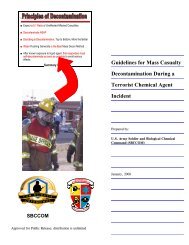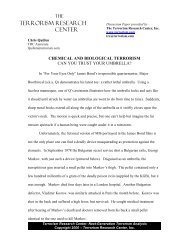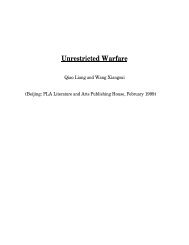Combating Proliferation of Weapons of Mass Destruction
Combating Proliferation of Weapons of Mass Destruction
Combating Proliferation of Weapons of Mass Destruction
You also want an ePaper? Increase the reach of your titles
YUMPU automatically turns print PDFs into web optimized ePapers that Google loves.
two cross-cutting issue sets in the National Security and International Affairs area. Thefirst, Counter-narcotics, had been presented to the Director in previous years, but thesecond, Transnational Issues, including proliferation, terrorism, continuity <strong>of</strong> government,protection <strong>of</strong> critical infrastructure, and international crime, was presented in the Director’sReview for the first time.Participation in the Interagency Policy Process. The OMB leadership participates inthe national security policy-making process through membership on key NSC committees.The Director <strong>of</strong> OMB is a member <strong>of</strong> the NSC Principals Committee and the DeputyDirector sits on the Deputies Committee (although in the Clinton Administration the DeputyDirector is usually represented by the PAD for National Security and International Affairs).The PAD or his designee is a member <strong>of</strong> the Interagency Working Group on Non-<strong>Proliferation</strong> and Export Controls, and OMB representatives <strong>of</strong>ten attend IWG sub-groupmeetings. The PAD is sometimes invited to informal White House discussions onproliferation issues.The PAD formerly chaired an informal group, un<strong>of</strong>ficially termed the EXOP (for ExecutiveOffice <strong>of</strong> the President), made up <strong>of</strong> representatives <strong>of</strong> White House <strong>of</strong>fices and chargedwith making recommendations on the Function 150 (Foreign Operations) account. Thisaccount contains all U.S. bilateral and multilateral foreign economic and militaryassistance, including funding the U.S. contribution to the Korean Peninsula EconomicDevelopment Organization (KEDO), which is a critical element in the Administration’s effortto halt the North Korean nuclear weapons program. This matter is <strong>of</strong> such importance,however, that it is almost certainly managed in the Deputies Committee.Many program functions in the proliferation area are dispersed as, for example, theCooperative Threat Reduction (CTR) program in Russia which involves the Departments<strong>of</strong> State, Defense, and Energy. OMB participates in the informal Office <strong>of</strong> the VicePresident-led interagency review <strong>of</strong> resources for CTR to ensure that the emergentstrategy is within budget constraints. Other proliferation issues, like the problem <strong>of</strong> KEDOfunding, reflect disagreements within the Administration over the source <strong>of</strong> funds forspecific programs.While OMB plays a significant role in the overall process <strong>of</strong> balancing competing interests,Director Jack Lew emphasized that his relationship with policy makers is personal, notinstitutional. He noted that OMB does not have sufficient staff depth to engage onsubstantive issues.Office <strong>of</strong> Science and Technology Policy (OSTP)The mission <strong>of</strong> OSTP is to provide expert, timely advice to the President in all areas <strong>of</strong>science and technology and to coordinate federal science and technology investment. TheOffice is headed by a Director who is appointed by the President and confirmed by the22







